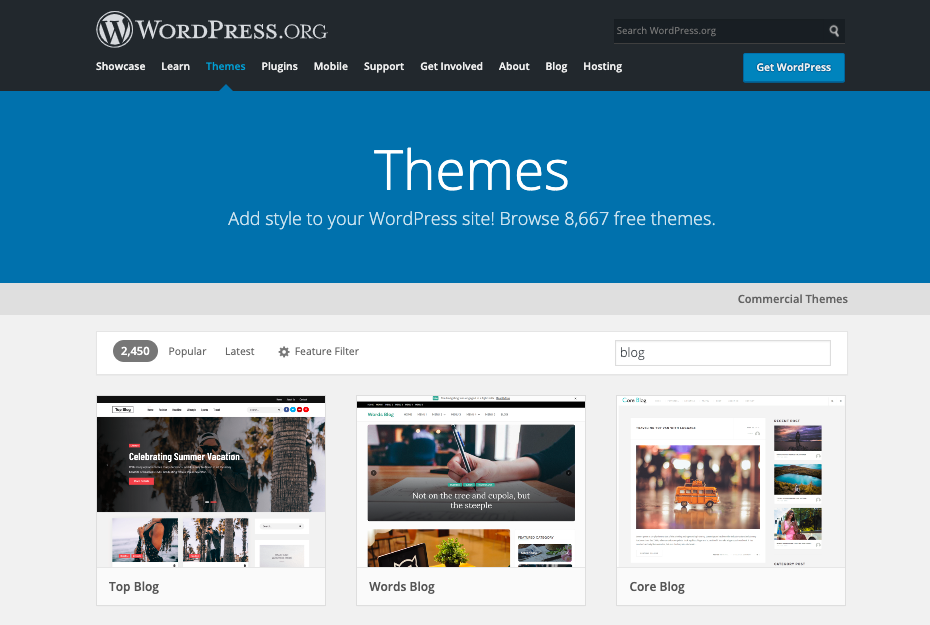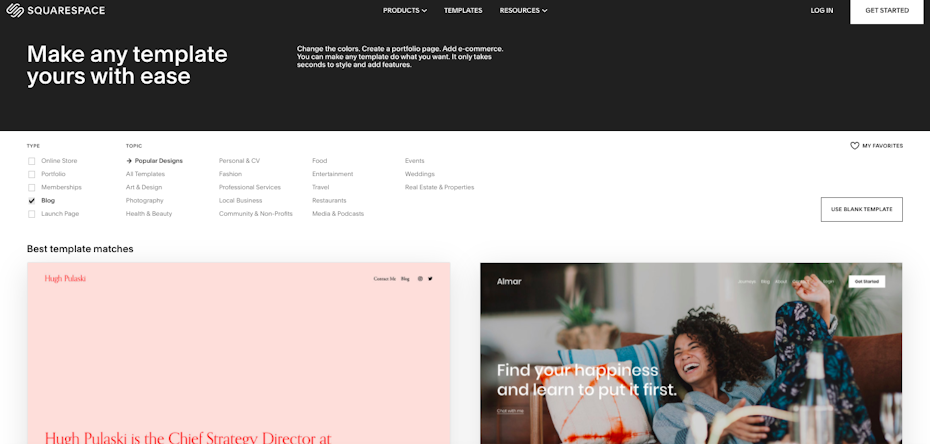Best Website Builders For Authors
Many website builders were originally designed for blogs. That makes sense—often, writers prefer to simply get to publishing right away with content that is clean and readable, and pouring resources into a flashy website can be unproductive. After all, the content is meant to speak for itself, not some gimmicky design. And the good news is, these days you don't have to make a choice between design quality and a quickly built website for a blog. There are plenty of great template options available, and we've collected our top picks for the best website builders for blogs.
For the uninitiated: a website builder is a service that allows you to create and customize a website without writing any code. All you have to do is make an account with the service, answer some questions about your website needs and goals, choose a template, customize the design with the platform's proprietary editor, pay and launch.

Because most website builders function similarly and there are so many around now, it can be difficult to know which choice is right for you. On top of that, many website builders are meant to appeal to a wide variety of website needs, meaning you also have to research whether a builder is ideal for blogging specifically. With that in mind, let's get the specific things you should look for when shopping for website builders for blogs.
What to look for in a website builder for a blog
—
Does it cover the entire web development process?
Most website builders will bill themselves as a one-stop shop (and most of the major ones are), but it's a good idea to verify this for yourself. Review the steps to create a website and double check that the builder will take care of each one. For example, one builder we'll discuss later requires you to secure your own hosting.

Does it have enough blog-specific features?
Blogs have specific needs that a general purpose website builder might not account for. In particular, you want to compare features like assigning authors, tagging/categories, how formatting multimedia works, email capture, scheduled posting, social distribution, SEO tools like alternate titles and descriptions, comment moderation, and traffic analytics. You'll also want to consider how easy it is to integrate third-party applications that fill in feature gaps you might need down the line.
What does the pricing include?
The appeal of website builders is that they are usually on the cheaper side, but it's not always that simple. Many website builders will have a variety of (often subscription) pricing tiers that come with specific features and benefits—all of which you will need to compare thoroughly. Pay special attention to benefits that are included on some platforms and left out on others.
Will the builder's brand intrude on your own?
While there's no shame in using a website builder (plenty of high profile blogs, as we'll see, do so) you don't necessarily want it telegraphed to your readers at every turn. When you're reviewing some actual blogs made with the software, be on the lookout for prominent signatures (e.g. "Powered by website-builder-name") or mandatory subdomains (e.g. "websitebuilder.businessname.com").
Does it sacrifice quality for ease of use?
Many website builders pride themselves on being easy to use, but this isn't always the perk that you think it is. For example, technically the easiest website to build is an unedited template. Any degree of customization necessitates some effort on your part, and higher degrees of customization may mean a more difficult building process, which can be worth it. You also want to consider how easy the ongoing site maintenance process will be, as well as adding new content to your blog.

What do users say about the service?
Look into reviews by ordinary people (which is to say, not the glowing testimonials companies highlight on their website). You can find reviews for digital services on sites like Trustpilot and Sitejabber. There, of course, will be some negative ones, but pay attention to the overall aggregate. It is also helpful to note how a company's support staff responds to negative reviews.
What is the design quality like?
With website builders, you will need to evaluate the quality of both the templates and the final, published product. For templates, what you are looking for is not only pretty designs but a wide and diverse selection. When reviewing actual blogs built with the software, try to steer clear of the famous blogs the site builder promotes. Look at blogs made by the average users to see how these compare to their templates.
The best website builders for blogs
—
- WordPress.org
- Webflow
- Wix
- Squarespace
- Substack
- Medium
- Weebly
- Blogger
WordPress.org
—
For a free, open source platform, WordPress is one of the most highly customizable and widely-used website builders around. In fact, a staggering 35% of all websites on the Internet run on WordPress (including our very own blog!). It is so versatile that it is often forgotten WordPress started mainly as a blogging platform. Now everyone from Rolling Stone Magazine to the White House is built on WordPress.

WordPress.org (not to be confused with the paid .com version) essentially gives you a blank page on which to build your site, and the DIY nature of the platform can make starting a blog more daunting. As a website builder, it allows for nearly limitless customization, provided you have the coding knowledge and design savvy to execute it.
You do have to work out several of your own features including hosting (BlueHost is recommended). But WordPress also includes third-party tools (called plugins, plenty of which are free) that can make this easier, providing templates, analytics, and more. All the same, WordPress is not for the faint of heart, so you're going to want to dedicate a fair amount of time to tutorials and learning before getting started.
Check out our guide to using WordPress >>
Pros
- Advanced customization options
- Plenty of support in the way of tutorials and user forums
- Can support complex websites/features
Cons
- Not immediately intuitive
- Can require basic HTML and coding knowledge
Price
- Free
- ~$15 per month for domain/hosting
- Variable for plugins
Skill level
- Intermediate to advanced
Real blogs that use this platform
- 99designs
- Adobe
- TED
The bottom line
WordPress is great for a reliable, long-running blog where you want more customization options than your average builder. But if you are a beginner looking for something fast and easy, it is not the best option.
Webflow
—
Webflow is a site builder that aims to make working with code easier through visuals. In place of templates and themes, Webflow prioritizes its page editor, where you can build a website completely from scratch using real HTML and CSS properties in a graphical interface. As a result, this can make Webflow much harder to use if you are not familiar with the basics of front-end development, though the site has plenty of educational resources. And compared to WordPress, Webflow's interface is far simpler to use while still allowing for nearly limitless customization.

On the blogging front, Webflow provides CMS (content management system) templates, which essentially provide a framework for storing and organizing your content. It also boasts easy on-page editing, as opposed to the back-end interfaces WordPress uses.
Pros
- High degree of customization
- Advanced editor capabilities
- Educational resources and support
Cons
- General purpose site builder
- Steeper learning curve
Price
- $12-$36 per month
Skill level
- Intermediate
Real blogs that use this platform
- I Ate Oklahoma
- Drunk by James
- Tea with Tami
The bottom line
Webflow is a great pick if you have a web design background and want far more control over the look of your website without the many workarounds and plugins that WordPress requires.
Wix
—
Wix prides itself on being an easy-to-use template site builder, but it also has a number of customization options available in its highly versatile editor. There is even a mode that allows you to work with your site's code if you so choose (of course, if you're going to all that trouble, WordPress would give you much more flexibility).

Essentially, you can use Wix one of two ways. You can start with a template and use a drag-and-drop editor to customize each detail. Or you can have the site built for you with the help of robots—that is to say, Wix's Artificial Design Intelligence (ADI). The ADI path uses a questionnaire to understand your needs and generate tailored design options for you.
Like many website builders, Wix is essentially a one-stop shop. You can set up a general purpose website, add a blog, an online store, get hosting and even get a readymade logo. Wix's templates for blogs come with views and like counters in addition to comments—attributes which some blog builders do not include.
Pros
- Large selection of templates
- Great editor capabilities
- Artificial intelligence tools
Cons
- General purpose site builder
- Storage is limited in pricing
Price
- $14-$39 per month
Skill level
- Beginner to intermediate
Real blogs that use this platform
- The Sofia Log
- Suvelle Cuisine
- Shot from the Street
The bottom line
For a template-based website builder, Wix offers a lot in the way of customization. Its ADI functionality makes it especially useful for non-designers or people who might get overwhelmed with too many customization options but still want something tailored to them.
Squarespace
—
If you've ever listened to a podcast or just been awake at any time in the past few years, you've heard about Squarespace. It's probably the most famous and widely marketed website builder out there. It works like all of them, using templates and a proprietary editor. When it comes to template customization, there are certain builders that give you more freedom. But it also boasts its Circle program, which can give you access to real web designers using Squarespace—certainly a step up from Wix's robots.

Where Squarespace really shines is its template selection. It has some of the most beautifully designed templates in the website builder space, several of which have been featured on Awwwards. In other words, while you have the ability to customize your template, you likely won't need to.
Pros
- Beautiful selection of templates
- Easy access to real designers
Cons
- General purpose site builder
- Comment moderation consists of an on/off switch
Price
- $12-$40 per month
Skill level
- Beginner to intermediate
Real blogs that use this platform
- The Girl Guide
- The Locals
- The Daileigh
The bottom line
Turn to Squarespace if you are looking for style above all, in addition to an easy web design experience.
Substack
—
Technically, Substack markets itself as a newsletter platform, but it is one of the fastest rising stars in the blogosphere. And to be honest, the difference between a blog and a newsletter gets into hairsplitting. While Substack targets readers through email, it also collects those newsletters chronologically as posts on the author's profile page—you know, like a blog.

Much of its popularity has to do with how it incentivizes readers to pay for quality writing by normalizing subscription fees (which writers can choose to charge). This is a nice trend of giving back to content creators that platforms like Patreon have paved the way for. At the same time, realistically this is only going to be useful if you already have a large established audience. Given the popularity of recurring subscription services like Netflix, your average reader is going to be wary of adding yet another one—for written content, of all things—unless you are particularly famous.
It is also worth a mention that Substack gives you an account page—identical to all others—within its own platform as custom design isn't really the point.
Pros
- Substack readers are accustomed to subscription pricing
- Helps writers build email lists
Cons
- Limited branding capabilities
- Subscription pricing is not useful without a large audience
Price
- Free
- $50 one-time fee for custom domain
Skill level
- Beginner
Real blogs that use this platform
- Hola Papi
- The Audacity
- Insight
The bottom line
While it might not be the best platform to build a readership, it can be a great space to transition to establish a paywall once you do.
Medium
—
Medium is a blogging platform that allows writers to tap into an existing community of readers. Essentially, users are divided into readers or writers on the platform. Readers are following topics that they are interested in, and writers tag their content with topics that fit. In this way, Medium's algorithm suggests content to readers, promoting your articles for you.

Medium also boasts curators—real people who are looking for standout articles to feature prominently under a specific topic. The best part about Medium is that it has a partnership program similar to YouTube, where content creators are paid based on factors such as reads or claps (their version of likes) once they've netted a high enough number of followers.
On the design front, aside from customizing your own imagery and logo, you're pretty much stuck with Medium's default branding.
Pros
- Great for building an audience
- Monetization based on readership
Cons
- Limited branding capabilities
- Plugins and integrations are not well supported
Price
- Free
Skill level
- Beginner
Real blogs that use this platform
- UX Collective
- The Startup
- Wil Wheaton
The bottom line
Medium can be a great starting point for writers to get their work in front of an audience and build up a readership.
Weebly
—
Weebly is a general purpose website builder much like its competitors Squarespace and Wix. What sets it apart is largely its intuitive editor—Weebly is one of those tools that feels especially designed for non-designers.

It also has an App Center that functions much like WordPress's plugins. This not only simplifies the editor by separating extraneous and potentially irrelevant features, but it also has several unique apps for blogs.
Pros
- Extremely easy to use
- Cheaper than competitor site builders
- Several plugin apps are available
Cons
- General purpose site builder
- Limited customization tools
Price
- Free-$26 per month
Skill level
- Beginner
Real blogs that use this platform
- Cold River Soap Works
- Butch Wonders
- Stasia Rose
The bottom line
What Weebly lacks in templates and customization, it makes up for in ease-of-use and app plugins. Consider Weebly if you want to customize your template but don't want to break your brain doing so.
Blogger
—
As the name suggests, Google's Blogger is one of the progenitors of DIY blogging, having launched during the internet's stone age in 1999. With age comes experience—Blogger now hosts millions of blogs, and it has remained just as convenient to use.

It is also completely free. In fact, you'll find that if you have a Gmail account you already have access to Blogger from the same dropdown housing Google's other apps (such as Docs and Calendar). It also integrates easily with Google Analytics and AdSense, meaning you can set up payment through ad revenue. You can't beat that kind of convenience.
Convenience, however, is about the best thing Blogger has going for it. In the 20+ years since its launch, plenty of competitors have sprung up that make Blogger's design themes and lack of website customization feel dated. Being such a large, free platform, it also lacks much in the way of support, outside of its FAQ help center. But Blogger was envisioned as a way to start publishing on the Internet right away at no cost, and it still accomplishes this goal exceptionally well.
Pros
- Easiest blog to set up
- Integrates easily with Google apps
- Platform is dedicated to blogging
Cons
- Theme selection is not as impressive
- Is not ideal for other website pages outside of the blog
Price
- Free
- ~$10 per year for a custom domain
Skill level
- Beginner
Real blogs that use this platform
- Girl Scouts
- Poets & Writers
The bottom line
Blogger remains a great choice for personal or hobbyist blogs, being free and simple to start up. While it does come with many of Google's tools built-in, you're better off going somewhere else if you need something more sophisticated.
The final word on blog builders
—
Website builders allow writers to get down to what matters: the actual writing. After all, filling a blog with regular content is stressful enough that you don't want to spend too much of your energy just setting things up.
At the same time, it would be a shame if your stellar content was overlooked due to an unattractive blog. While many website builders do provide both quality and speed, many are ultimately templates—used by many other blogs across the web. So when you're ready for that extra professional design touch, consider contracting a freelance web designer.
Want to get the perfect design for your blog?
Work with our talented designers to make it happen.
Best Website Builders For Authors
Source: https://99designs.com/blog/web-digital/best-website-builders-for-blogs/
Posted by: higginbothamfacking.blogspot.com

0 Response to "Best Website Builders For Authors"
Post a Comment